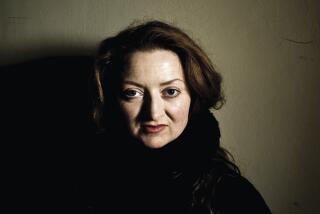Turgenev’s ‘Fathers and Sons’
- Share via
From the time of its publication in 1861 to the present, no other Russian novel has stirred up quite as much controversy as Ivan Turgenev’s “Fathers and Sons.” For a reader dependent on translations for familiarity with the great Russian novelists of the 19th Century--and no group is greater--this is ironic.
Henry James did not include his essay on Turgenev in “French Poets and Novelists” (1878) because he was under any delusion as to Turgenev’s nationality but because he had read him in French and felt him to be the most accessible of all the Russians to English and American readers. This is true enough in the sense that Turgenev was as familiar with the Continent as with his own inherited estate, Spasskoe, and once he had met and fallen in love with a French singer, Pauline Viardot, he followed her on many of her tours and actually settled in Baden-Baden with the Viardots in 1863, making regular visits during the following years to Russia.
Though the controversy continued in a variety of forms, springing up again in the Soviet Union, Turgenev still offers a bridge to Russian letters, an escape from the usually controversial allegiance either to Tolstoy or Dostoevsky, making it possible, as a matter of fact, to avoid that decision entirely. And for the hesitant, perhaps a quotation from Sinclair Lewis, our half-forgotten first American Nobel laureate in literature, is in order:
“ ‘Fathers and Sons’ is a profound tale, a gentle tale, starred with two simple-hearted but imaginative love-stories, and in it the Russian Gloom is lightened by a friendliness that is better than any conscious parade of humor. The book is about as long as a full-dress chapter in Thomas Wolfe, that Russian from North Carolina, or in Tolstoy, that Carolina planter from Russia; and, with most readers, that will be all right.” Or, in the words of John T. Winterich, “ ‘Fathers and Sons’ is a short novel as Russia novels go, and Russian novels usually go pretty far.”
As its title suggests, the novel, ably and sympathetically read here by Walter Zimmerman, offers a picture of the opposing points of view of two generations at a crucial point in Russia’s history. In the year of its publication, Alexander II liberated the serfs, an act that he was to tell Turgenev himself had been influenced by his reading what many cherish as the writer’s most satisfying work, “A Sportsman’s Sketches.”
In “Fathers and Sons,” purposely set in the period before the liberation of the serfs, Bazarov, the leading character, represents the radical younger generation coming of age in Russia. He makes every effort to convert his conservative father to his own revolutionary, “scientific” convictions. He is never successful in this, though his father does his best to understand his son.
The action opens on the estate of a friend of Bazarov’s, Arcadi Kirsanov, the other “son” of the title, less radical than Bazarov but still of his generation. On the estate, Arcadi’s uncle and his father, Nikolai Petrovich, reflect the views of the older generation and thus become the targets of Bazarov’s attack.
In spite of Sinclair Lewis’ comment on the “two simple-hearted love-stories,” four love stories are involved here, at least one of which ends in the happy marriage of Arcadi and Katya. The others involve a duel and provide a critical view of the older generation’s behavior.
Though Turgenev writes from time to time as a satirist, he is a gentle satirist. Thus when he found that neither the older generation of Faith nor the new generation of Science was happy with his novel, each feeling that it had been distorted, mocked and made to appear ridiculous, he was taken aback. For the rest of his life he tried to explain his intentions and justify his work, finally growing bitter as he considered revisions that would make his intention clearer. The ultimate irony in this critical conflict is the fact that we owe the creation of the word nihilist to Turgenev, who was far from being one.
These fretful issues fall away as one listens to Zimmerman’s reading of the story as it rises to a climax with Bazarov’s return to help his father in his country medical practice, and the story ends with emotional force in scenes that it would be a betrayal to describe for anyone who comes to this masterpiece for the first time.
Those familiar with the climax may wish to reflect on the last sentence of Henry James’ essay on Turgenev: “To our usual working mood the world is apt to seem M. Turgenev’s hard world, and when, at moments, the strain and the pressure deepen, the ironical element figures not a little in our form of address to those short-sighted friends who have whispered that it is an easy one.” Or perhaps not.
WHERE TO ORDER TAPES: Books on Tape, P.O. Box 7900, Newport Beach, CA 92660. For either rental or purchase, call 1-800-626-3333. Unabridged; 8 cassettes.
More to Read
Sign up for our Book Club newsletter
Get the latest news, events and more from the Los Angeles Times Book Club, and help us get L.A. reading and talking.
You may occasionally receive promotional content from the Los Angeles Times.






